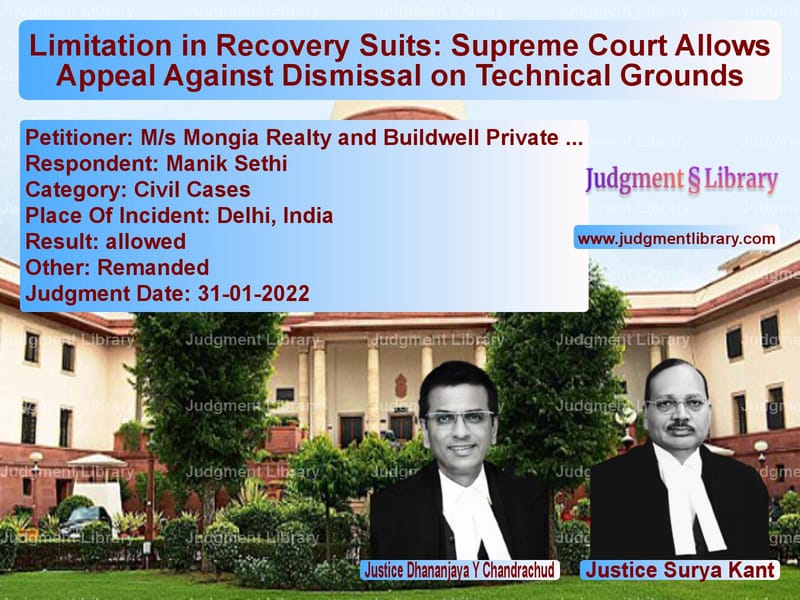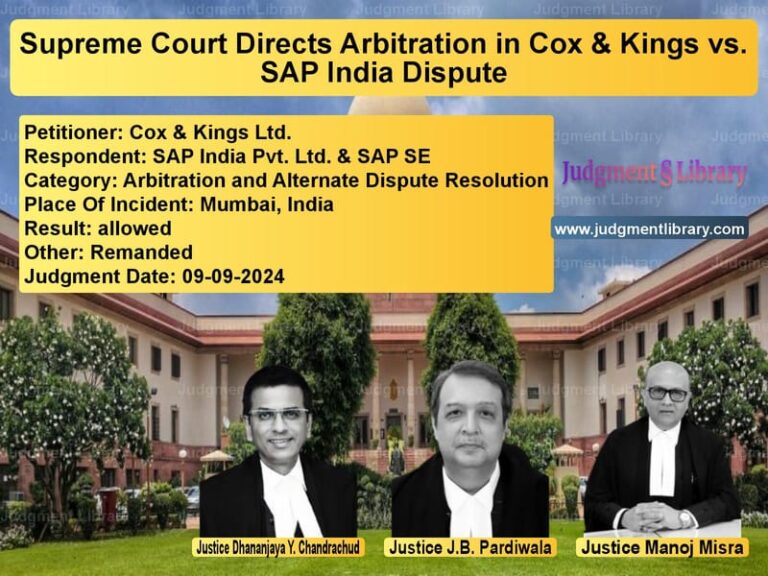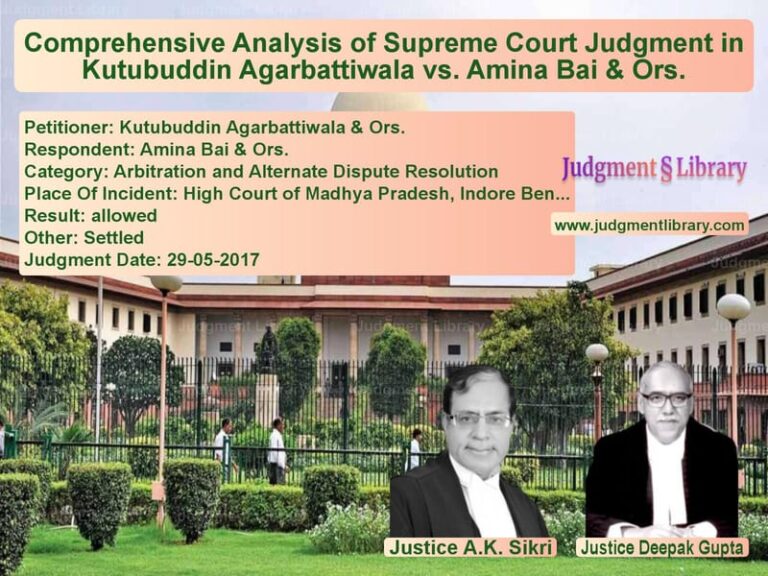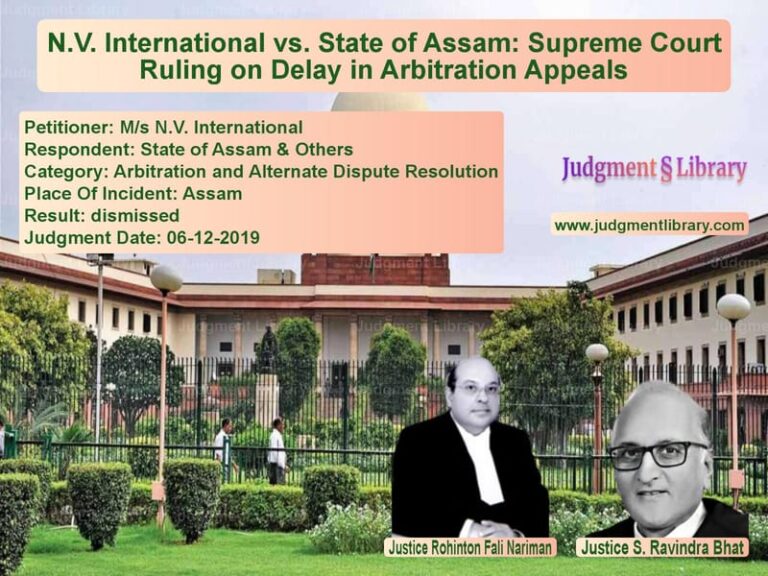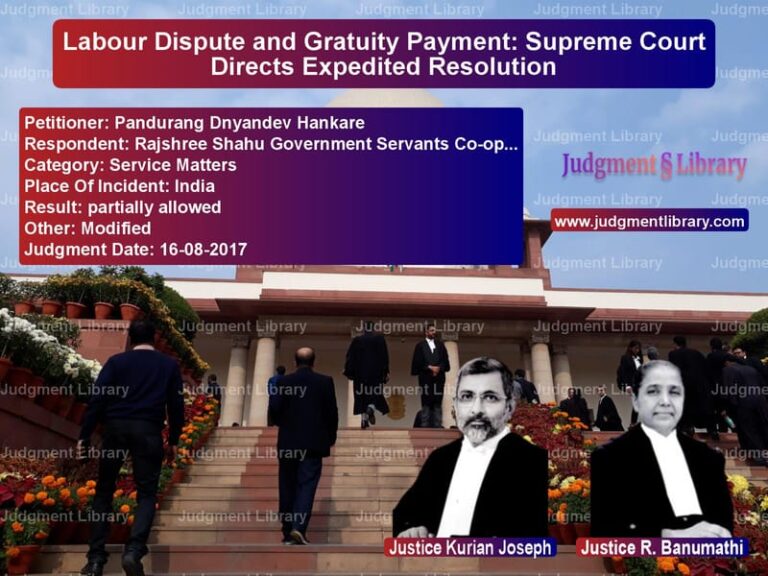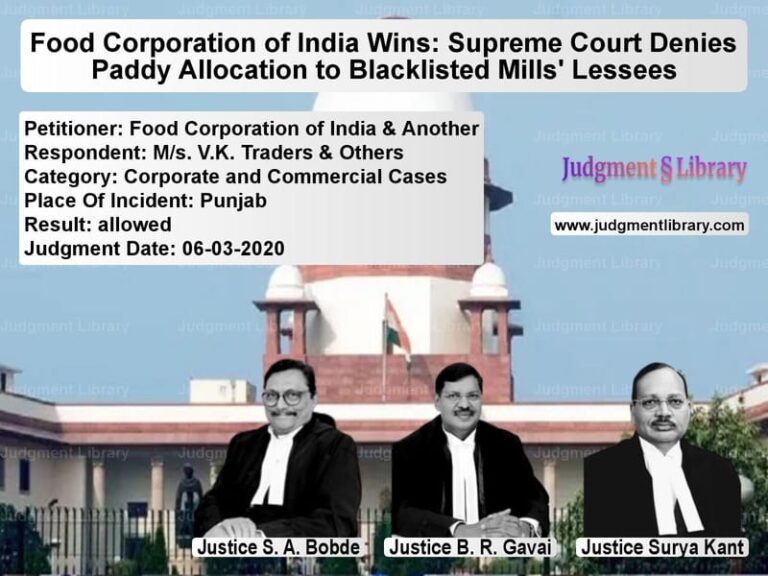Limitation in Recovery Suits: Supreme Court Allows Appeal Against Dismissal on Technical Grounds
The case of M/s Mongia Realty and Buildwell Private Limited v. Manik Sethi dealt with an appeal challenging the dismissal of a recovery suit on the ground of limitation. The Supreme Court had to determine whether the High Court and the trial court erred in rejecting the suit without allowing proper trial on the disputed facts.
Background of the Case
The appellant, M/s Mongia Realty and Buildwell Private Limited, filed a suit against the respondent, Manik Sethi, on March 31, 2017, for the recovery of ₹1,11,63,633 along with 18% interest per annum. The appellant claimed that the respondent had borrowed amounts in multiple transactions and failed to repay the full amount.
The suit was filed under Order 37 of the Code of Civil Procedure, 1908 (CPC), which provides a summary procedure for recovery of money. However, the respondent argued that the suit was barred by limitation. On January 4, 2018, the trial court framed a preliminary issue regarding limitation. The appellant was given an opportunity to file arguments but failed to do so on time.
On August 16, 2018, the trial court dismissed the suit as time-barred. The appellant’s appeal before the Delhi High Court was also dismissed on September 4, 2019, leading to this appeal before the Supreme Court.
Arguments of the Appellant (M/s Mongia Realty and Buildwell Private Limited)
- The appellant contended that the suit was within limitation as per an oral agreement that the loan was repayable within one year from the last installment.
- The respondent had made the last payment on October 24, 2013, and thus, the limitation period started from April 9, 2014, making the suit filed on March 31, 2017, within time.
- The trial court wrongly decided the issue of limitation without taking evidence and based only on oral arguments.
- The High Court erroneously dismissed the appeal, stating that the company could not rely on oral agreements.
Arguments of the Respondent (Manik Sethi)
- The respondent denied taking any loan and stated that the payments were for real estate commission and business transactions.
- The last payment was made on October 24, 2013, meaning the suit filed in March 2017 was beyond the three-year limitation period under the Limitation Act, 1963.
- The appellant failed to provide a written agreement specifying the repayment period.
- The trial court rightly dismissed the case as time-barred, and the High Court correctly upheld the decision.
Key Observations of the Supreme Court
1. Premature Dismissal on Limitation Without Trial
The Supreme Court noted that the issue of limitation was not a pure question of law but involved disputed facts. The Court observed:
“The case of the appellant has to be proved on the basis of evidence adduced in the suit. Such an issue could not have been decided purely on the basis of oral arguments urged on behalf of the contesting parties.”
2. Contradictory Claims Require Proper Examination
The Court found that the respondent’s denial of the loan and the appellant’s assertion of an oral agreement created a factual dispute that needed trial.
“There are two conflicting versions on the nature of the business transactions between the parties. The appellant alleges it was a loan, while the respondent claims it was commission for real estate services.”
3. Limitation Requires Evidence
The Court cited its previous ruling in Nusli Neville Wadia v. Ivory Properties, which held that limitation can be decided as a preliminary issue only if the facts are undisputed. In this case, since the limitation argument depended on whether the transactions were loans or commissions, the matter required evidence.
“If the issue of limitation is based on disputed facts, it cannot be decided as a preliminary issue.”
4. CPC Order XIV Rule 2 Interpretation
The Supreme Court referred to Order XIV Rule 2 of the CPC, which allows courts to decide a case on a preliminary issue only if it relates to jurisdiction or a legal bar. However, when the issue requires factual determination, it must be decided at trial.
“The issue of limitation in the present case is not a pure question of law. It requires evidence and cannot be decided as a preliminary issue.”
5. High Court’s Incorrect Assumption
The High Court had ruled that a company could not rely on an oral agreement. The Supreme Court disagreed, stating:
“Just because the appellant is a company does not mean it could not have an oral understanding regarding loan repayment. This requires factual proof.”
Final Judgment
The Supreme Court set aside the judgments of the trial court and the High Court. The key takeaways from the judgment are:
- The issue of limitation cannot be decided without considering evidence.
- Conflicting claims regarding the nature of transactions require trial.
- Oral agreements should not be rejected outright without factual inquiry.
- The case is remanded back to the trial court for full adjudication on merits.
This ruling ensures that technicalities do not prevent substantive justice and emphasizes the need for proper fact-finding in limitation disputes.
Petitioner Name: M/s Mongia Realty and Buildwell Private Limited.Respondent Name: Manik Sethi.Judgment By: Justice Dhananjaya Y Chandrachud, Justice Surya Kant.Place Of Incident: Delhi, India.Judgment Date: 31-01-2022.
Don’t miss out on the full details! Download the complete judgment in PDF format below and gain valuable insights instantly!
Download Judgment: ms-mongia-realty-an-vs-manik-sethi-supreme-court-of-india-judgment-dated-31-01-2022.pdf
Directly Download Judgment: Directly download this Judgment
See all petitions in Contract Disputes
See all petitions in Debt Recovery
See all petitions in Specific Performance
See all petitions in Damages and Compensation
See all petitions in Judgment by Dhananjaya Y Chandrachud
See all petitions in Judgment by Surya Kant
See all petitions in allowed
See all petitions in Remanded
See all petitions in supreme court of India judgments January 2022
See all petitions in 2022 judgments
See all posts in Civil Cases Category
See all allowed petitions in Civil Cases Category
See all Dismissed petitions in Civil Cases Category
See all partially allowed petitions in Civil Cases Category

